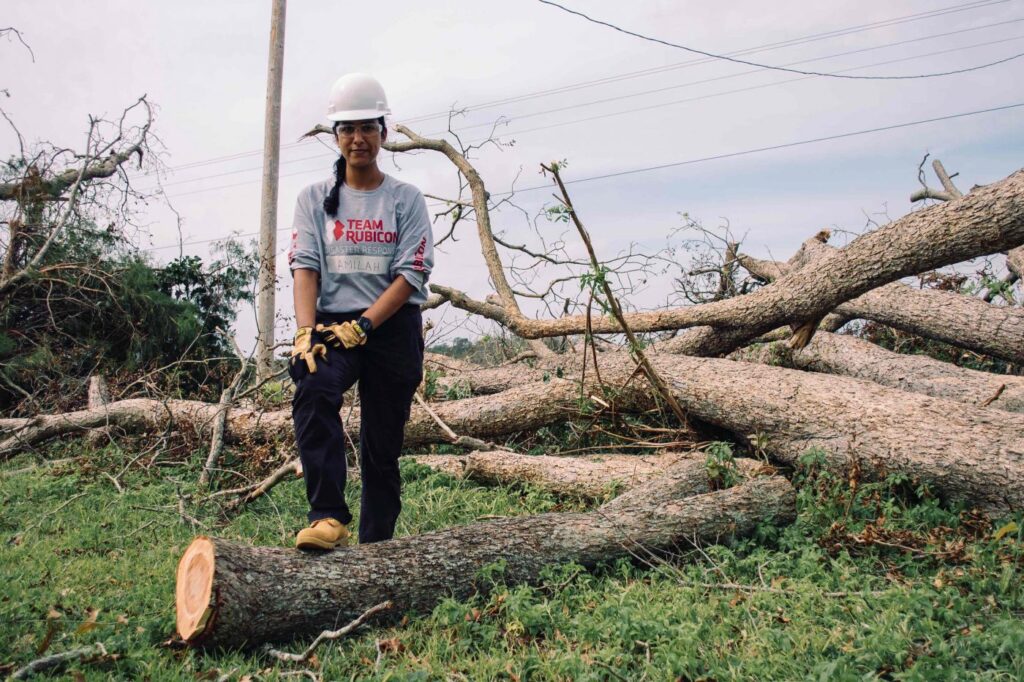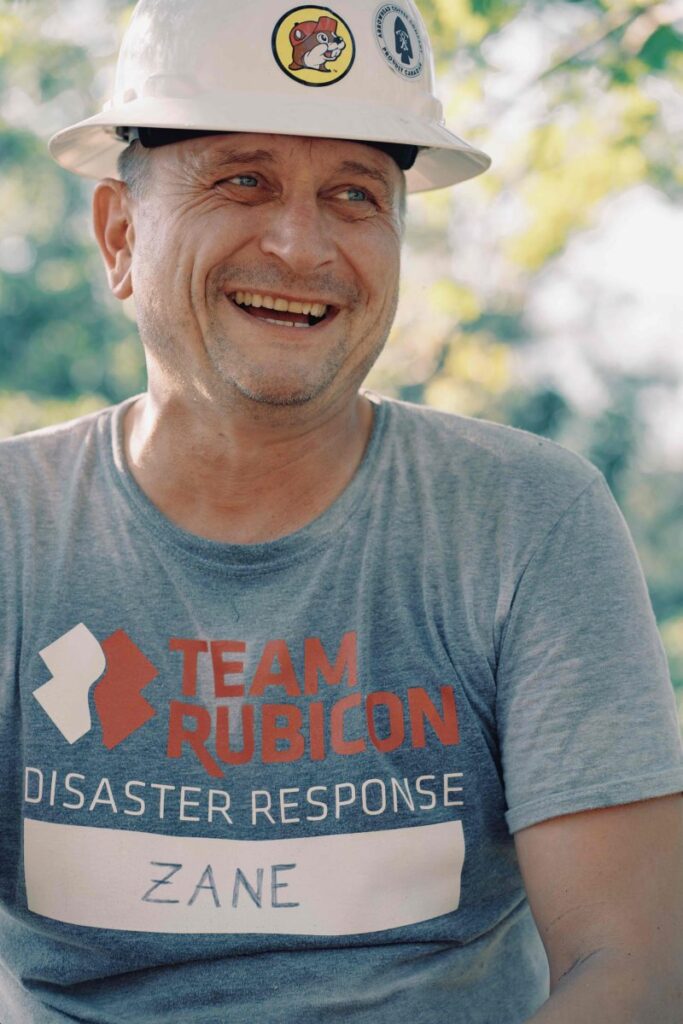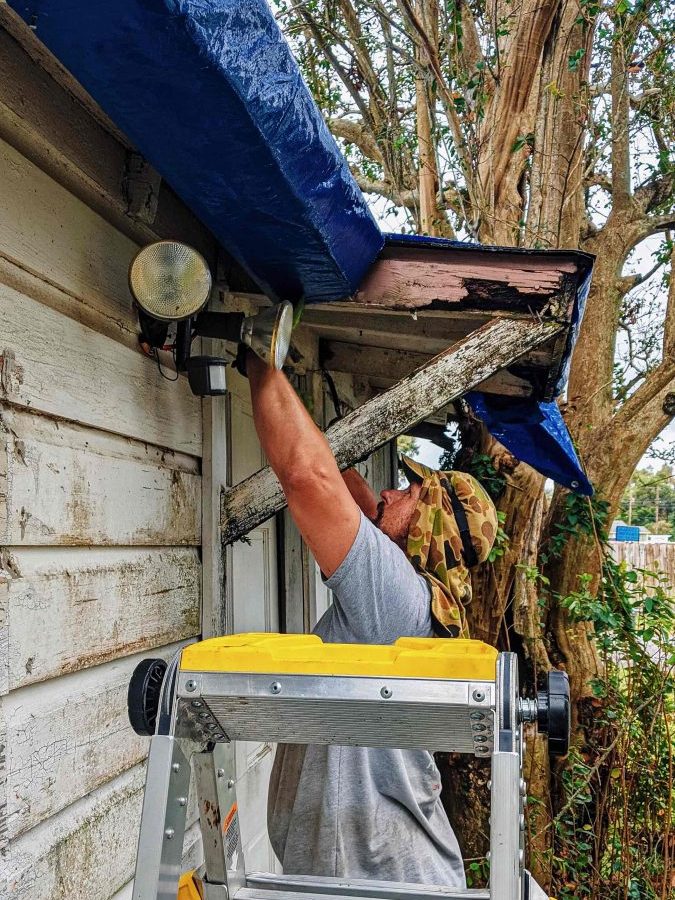Before responding to Hurricane Sally with Team Rubicon, Canadian lawyer Amilah Abd-Al-Rashid had never held a chainsaw. After, she held her Chainsaw 1 qualification, and the knowledge she’d played a part in helping 584 survivors in Florida and Alabama get back into their homes.
Abd-Al-Rashid is one of the 17 Greyshirts from Team Rubicon Canada who deployed to hurricane response operations on the U.S. Gulf Coast this year with Team Rubicon. It was also the first international disaster relief operation her and for many of the other Canadian Greyshirts. Over the course of four weeks—Abd-Al-Rashid extended her deployment mid-operation—she mucked out houses, tarped roofs, and used the new chainsaw skills she received in on-site training to help remove countless downed trees from homeowner properties.
“Team Rubicon is the best place to help people and get the job done,” she says.

The historically violent 2020 Atlantic hurricane season—during which six hurricanes hit the U.S., including three that made landfall in Louisiana—caused devastation in coastal communities from Texas to Florida. In response, Team Rubicon launched two emergency relief operations: Operation Crying Eagle which served residents of Calcasieu Parish, LA and Orange, TX affected by Hurricanes Laura and Delta, and Operation Damn the Torpedoes which served residents of Baldwin County, AL and Escambia County, FL affected by Hurricanes Sally and Zeta. In all, more than 1,400 Greyshirts deployed on the two operations, providing muck outs, roof tarping, route clearance, and debris management for 1,872 residents whose homes were damaged by the storms. For the 17 Greyshirts of Team Rubicon Canada, these large, multi-week operations also offered the chance to gain experience in disaster response environments not typically found north of the border.
It may seem like an ordeal to travel all the way from Canada to the Gulf of Mexico to perform volunteer labor in grueling heat—especially given the added difficulties created by COVID-19—but Andrei Roberge, Team Rubicon Canada’s Director of Field Operations and Planning, was not at all surprised by his Greyshirts’ eagerness to volunteer. He points out that many Canadians have close ties to friends and family in the U.S. and that a long history of cooperation exists between the two nation’s militaries. Following Hurricane Laura, Roberge received texts from Canadian Greyshirts asking when they could deploy, even before he had time to draft a mobilization email.
“The biggest takeaway was just how much people want to do this,” says Roberge. “If it hadn’t been for COVID-19 travel restrictions, we easily could have sent 60 people.”
Bonds Built Through Service
Zane Piekenbrock, a veteran of the Canadian Army and first-time Greyshirt, was shocked to arrive in Alabama and discover how few hurricane survivors had home insurance. It made him realize that Team Rubicon really was their only hope.
One of the homeowners his strike team assisted was an older gentleman whose house had been flooded by torrential rains from Hurricane Sally. On the day Piekenbrock and team arrived and got to work, the man was sullen and listless, still seemingly in a state of shock. Yet the very next day, “he was up and helping us muck out his basement,” Piekenbrock recalls. It was as if just by being there the Greyshirts had given the homeowner the boost he needed to begin recovering.

“When you’re talking to the homeowners and they realize that people are coming from all over North America to help, it lets them know that they’re not forgotten,” says Piekenbrock. Experiences like these moved Piekenbrock so much that he redeployed to Louisiana almost immediately after returning home.
In addition to learning new skills and having meaningful interactions with survivors, these operations gave Canadian and American veterans an opportunity to form connections. While there may have been some gentle ribbing, with Americans teasing their Canadian counterparts about their accents, a deep respect underpinned the relationships.
Irv Heide, a Royal Canadian Mounted Police veteran who deployed on Operation Crying Eagle—his third deployment with Team Rubicon—noticed that what sets Canadian and U.S. veterans apart might be the combat seen or where they served. What ties them together is often bearing witness to each other’s stories.
“I’m always impressed by hearing how many difficulties they have overcome and that they still continue to serve,” says Heide.
Piekenbrock noted of the American Greyshirts that “nobody ever walked past a problem” when challenges large or small arose on a work site. He believes that’s a mentality instilled by military service, and one he hopes to pass on to the growing number of new Canadian Greyshirts.
Leading the Way for Future Cooperation
Going forward, Team Rubicon Canada will become an even stronger organization thanks to the 17 Canadian Greyshirts who served on operations Crying Eagle and Damn the Torpedoes in Texas, Louisiana, Alabama, and Florida and the skills and experiences they bring back with them. In total, Canadian Greyshirts performed nearly 11,160 hours of volunteer labor on the two ops and earned 17 new qualifications. Several of them also trained and served in roles on the Incident Management Team, including Abd-Al-Rashid who served as Planning Section Chief on Operation Damn the Torpedoes, and Piekenbrock who served as Operations Section Chief for the demobilization of Operation Crying Eagle. Such leadership experiences will not only play an important role in shaping Team Rubicon Canada’s culture, but will also further build out the already extensive interoperability between the two organizations.

Now, thanks to the successes of these 2020 operations, American Greyshirts can look forward to serving alongside more Canadians soon.
“There will come a time when the flow of Greyshirts back and forth across the border will be seamless. We are going to get there,” says Roberge.
Though some friendly rivalry and ribbing may always exist between Greyshirts from Canada and the U.S., the desire to create the most impact for people in need makes closer collaboration necessary and inevitable. Or, as Heide says, “disasters have no borders, and neither do Greyshirts.”
Read the reflection “In Service, Finding Soul Food” by Canadian Greyshirt Tim Wedesweiler.



